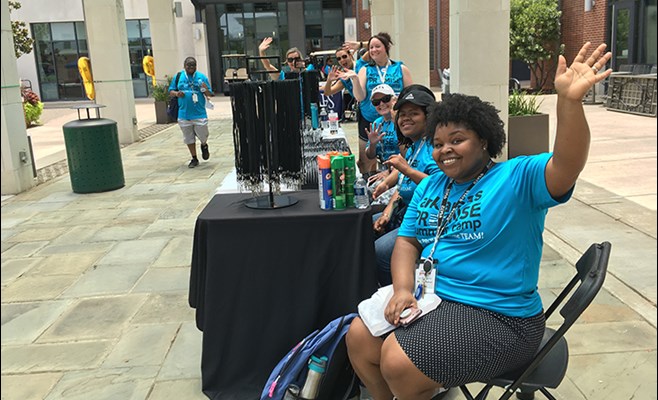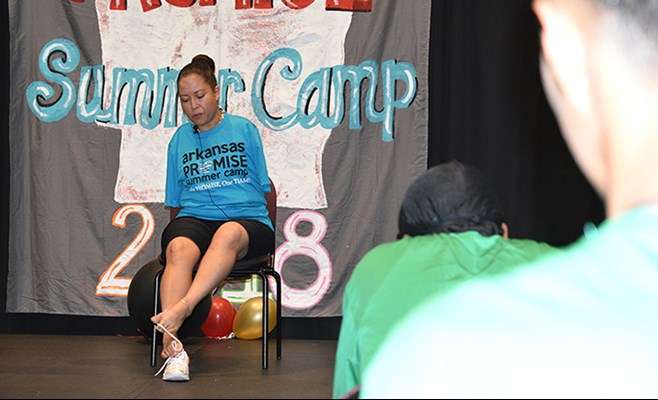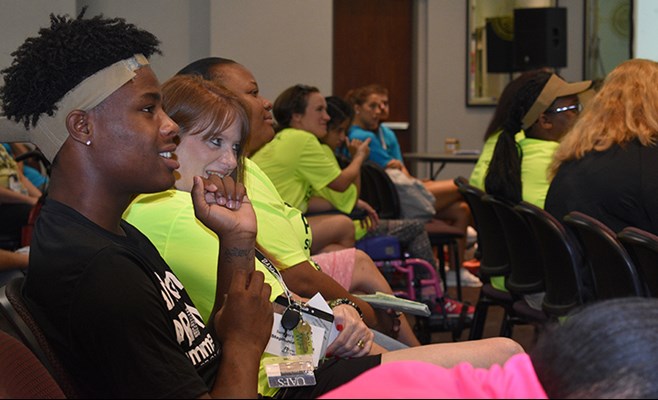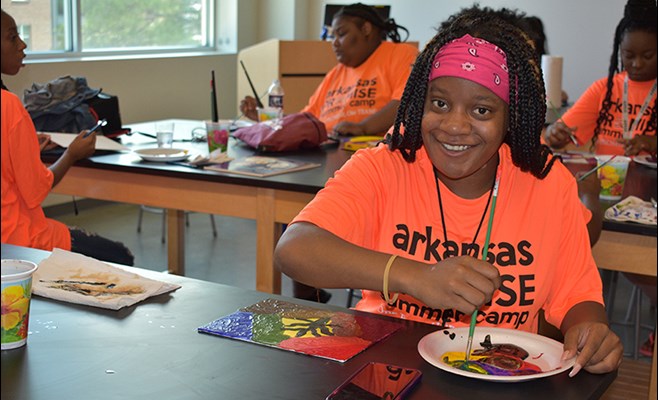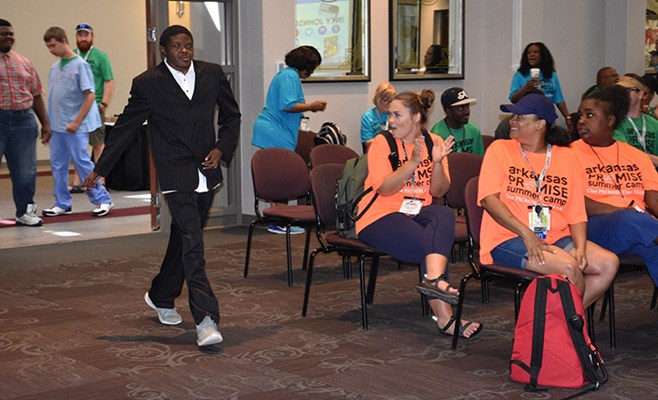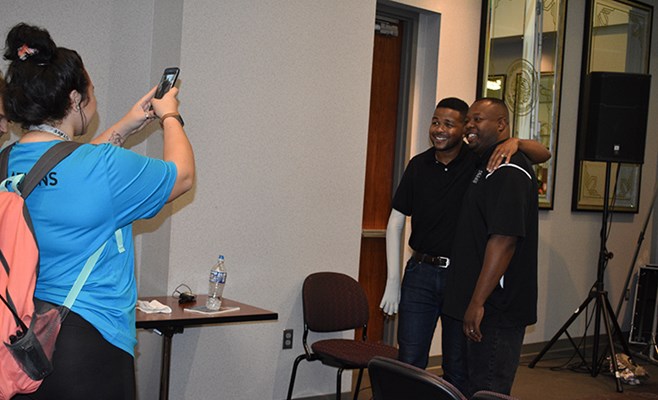Summer Camp Teaches Teens With Disabilities to Advocate for Themselves
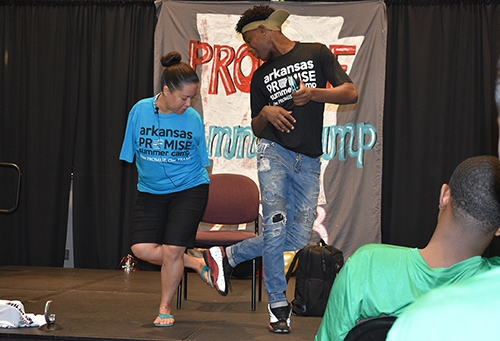
Jessica Cox and a PROMISE youth participant do the "foot five," which Cox said was her version of a handshake.
Summer camp is the first time many of the Arkansas PROMISE project youth participants with disabilities have been away from home and their families and their first exposure to a college campus. The camp's focus is not only to teach the teens to advocate for themselves, but also to think about college and careers — and to have fun.
Last month, more than 160 students from 25 counties in Arkansas attended the weeklong camp at the University of Arkansas at Fort Smith. It was the third year for the camp and the second year at UAFS, which is a part of the University of Arkansas system.
Brent Thomas Williams, principal investigator of PROMISE, described summer camp as a time for youth in the PROMSE project to take ownership of a place of higher education.
"Most of our PROMISE youth wouldn't consider a university setting as an environment where they would be welcome, a place where they would fit in," Williams said. "One of the primary goals of summer camp is for our youth to feel that they have a place in and right to higher education and that they get to decide the educational setting that best serves their aspirations and abilities."
The Arkansas PROMISE project is funded by a five-year research grant of $35.7 million to the University of Arkansas College of Education and Health Professions and the Arkansas Department of Education. PROMISE provides a group of 1,000 teens who receive Supplemental Security Income two paid summer work experiences as well as additional training and intensive support services. Each work experience is about 200 hours. A second group of 1,000 teens receives only the usual services provided to youth with disabilities.
Researchers will compare post-secondary and employment outcomes of the two groups and report to the U.S. Department of Education, which will determine whether a program such as PROMISE can help participants improve their standard of living.
At summer camp, PROMISE participants attend general sessions with speakers on topics such as self-advocacy and breakout sessions about college and career topics.
"We choose speakers who can connect with the kids and who can articulate that having a disability is a part of who they are," said Carri George, the curriculum director who develops the general and breakout sessions during camp. "We want them to understand having a disability is cool and not something they have to hide. At the same time, they have to learn to advocate for themselves when they face barriers that could be addressed by building designers, for example.
"Someone like Jessica Cox talks about what is normal for her even though other people get caught up in how she does things differently," George continued. "It's about being aware of the environment and what things you can use to make accommodations. If we can talk about what we need, we can be successful on the job or at school. Sometimes, it's a matter of explaining that you need the instructions repeated or written down, and it is not that you're ignoring what you've been asked to do."
Cox, an author and motivational speaker from Arizona, spoke to the group Tuesday about tools she uses to accomplish with her feet what most people use their hands to do. She was born without arms and, in addition to writing Disarm Your Limits published by her company, Cox is the only licensed pilot without arms and holds a black belt in taekwondo. She also drives a car, surfs and scuba dives.
She encouraged the PROMISE participants to "think outside the shoe," a reference to how she learned to tie her shoes as a little girl. She developed a SHOE acronym to remind students to take a closer look at the Self-limiting beliefs, Habits, Over-complications and Excuses that might be holding them back from doing what they want to do.
She said that people often have misconceptions about her and she likes to tease them. For example, a restaurant server may expect her husband to feed her so she turns the tables and feeds him.
Lolo, the creator of a web series of videos called "Sitting Pretty," talked to the teens Wednesday. Her videos describe her life as someone who uses a wheelchair, covering topics from how to help someone who uses a wheelchair transfer from the chair to a car or other location to her top five dating struggles.
According to Lolo, good communication is crucial. People with disabilities need to communicate clearly what they need help with and when, and other people who want to help should ask the person with disabilities exactly what they need and their preferences for assistance.
In her video titled "Things Not to Say to Someone in a Wheelchair," Lolo suggests people think before they say someone with a disability inspires them just because they are doing normal, everyday things like smiling or eating at a restaurant.
In 2006, Inky Johnson, who spoke Thursday, was eight games away from finishing his college football career at the University of Tennessee and moving on to the NFL. He told his family that, with the money he would make, they would never miss another meal. Instead, he suffered an injury that paralyzed his right arm and ended his playing days. Johnson said he would not change his experience resulting from the injury and the recovery time.
"Who's to say I would be the same father, the same husband, the same servant that I am now?" Johnson asked.
He now works with the homeless of Atlanta, where he grew up, as well as mentoring youth and traveling to speak to groups.
In the breakout sessions in late morning and afternoon, the teens learned about such topics as bullying and peer pressure, social media etiquette, college and career-planning.
The week's activities also included recreation, a pool party, dance and talent show. Jamie Thornton, camp director, said the social events focus on how to build and maintain relationships.
"Throughout the week of camp activities, you can see the confidence in our campers grows exponentially," Thornton said. "It's a really cool thing to be a part of."
Contacts
Heidi S. Wells, director of communications
College of Education and Health Professions
479-575-3138,
heidisw@uark.edu
Headlines
U of A Bands to Hold Three Nights of Concerts
The Symphonic Band, the Wind Symphony, the 4 O'Clock and 5 O'Clock Bands and the Wind Ensemble will perform April 21-23 at the Faulkner Performing Arts Center on the U of A campus.
Honors College to Host 'Best in Show' Dog Celebration
The campus and community are invited to celebrate our furry friends with popsicles, water and dog treats from 3-4 p.m. Thursday, April 25, in the Gearhart Courtyard.
New Parasite Affecting Canadian Partridges Named for Arkansas Poultry Scientist
A long-time colleague in Canada gave a newly found parasite the scientific name Eimeria hargisi in honor of U of A poultry science researcher Billy Hargis.
U of A School of Law Student Selected for Ms. J.D. Leadership Academy Intensive
Tristan Branstetter-Thomas, a second-year law student, was one of 30 students from across the country chosen to participate in the leadership academy at the Northwestern Pritzker School of Law in Chicago.
Needy Honored as Distinguished Alumna of University of Pittsburgh Engineering College
College of Engineering Dean Kim Needy was among seven alumni of the University of Pittsburgh Swanson School of Engineering honored in April as part of the 2024 Class of Distinguished Alumni.
